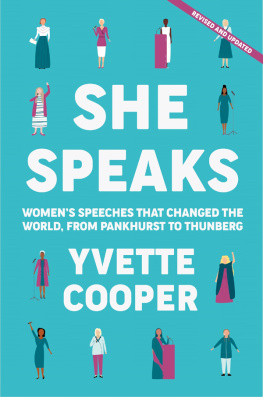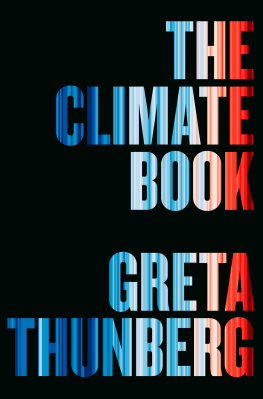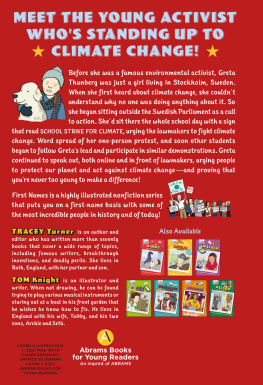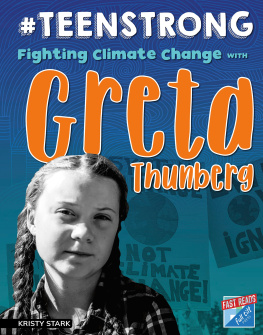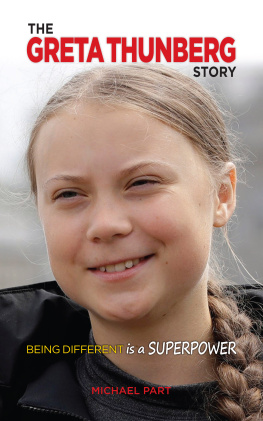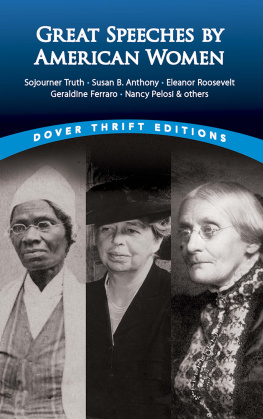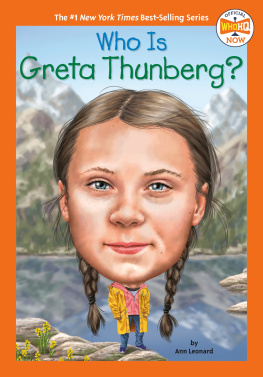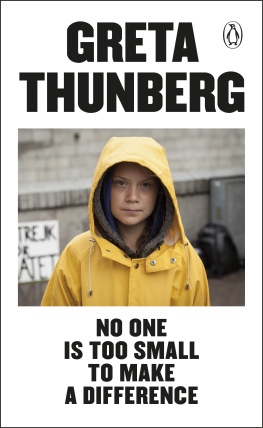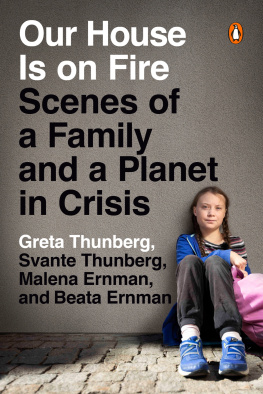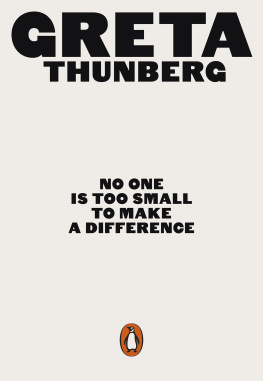Contents
Guide
SHE SPEAKS
About the Author
Yvette Cooper is the Labour MP for Normanton, Pontefract, Castleford and Knottingley. She served as a minister and then Cabinet minister in the 19972000 Labour Government, including as Chief Secretary to the Treasury and Secretary of State for Work and Pensions. She was the first Cabinet minister to take maternity leave and has campaigned on issues from child poverty and economic regeneration to online abuse and child refugees. Since 2016 she has been chair of the Home Affairs Select Committee. She is also a mum, a terrible but enthusiastic gardener, and enjoys overly competitive family sports.

First published in hardback in Great Britain in 2019 by Atlantic Books, an imprint of Atlantic Books Ltd.
This paperback edition published in 2020
Copyright Yvette Cooper, 2019, 2020
The moral right of Yvette Cooper to be identified as the author of this work has been asserted by her in accordance with the Copyright, Designs and Patents Act of 1988.
All rights reserved. No part of this publication may be reproduced, stored in a retrieval system, or transmitted in any form or by any means, electronic, mechanical, photocopying, recording, or otherwise, without the prior permission of both the copyright owner and the above publisher of this book.
Every effort has been made to trace or contact all copyright holders. The publishers will be pleased to make good any omissions or rectify any mistakes brought to their attention at the earliest opportunity.
10 9 8 7 6 5 4 3 2 1
A CIP catalogue record for this book
is available from the British Library.
Internal illustrations Anna Higgie
Text design by www.benstudios.co.uk
Paperback ISBN: 978 1 78649 994 3
E-book ISBN: 978 1 78649 995 0
Printed in Great Britain
Atlantic Books
An imprint of Atlantic Books Ltd
Ormond House
2627 Boswell Street
London
WC1N 3JZ
www.atlantic-books.co.uk
CONTENTS
Preface to the Paperback Edition
Womens voices have been sidelined for too long. Its time to fight back to promote, debate and celebrate the public words of women through the ages and across the world. That is why I put together this collection of womens speeches to tell the stories of the incredible women behind them, to inspire readers, and to encourage more women to speak out.
In the hardback edition, published in November 2019, I argued that spoken words matter, speeches matter, that they are pathways to power. When womens voices are not heard, it undermines democracy and hurts us all. I challenged the speech anthologies, public events and conference line-ups that still carry so few womens words, and chronicled the attempts to silence women, both today and throughout history.
A few short months later, as I write these words for the paperback edition, everything has changed and nothing has changed. The world has been turned upside down by the COVID-19 global pandemic. Things once unimaginable have come to pass, with the heartbreaking loss of so many lives, with families kept apart, and with schools, workplaces and community centres closed to keep people safe. For months, the public forums for speeches have been silent. It is poignant to think of the words not spoken as weddings and wakes were put on hold; sports games, political rallies, conferences and graduation ceremonies were cancelled; and religious sermons were suspended. We have had to learn new ways to reach out and connect with each other, applauding key workers from doorsteps and balconies, speaking and meeting online. Even Parliament closed temporarily, and I could never have imagined that I would make a speech to the House of Commons whilst sitting at home in an upstairs room, staring into Zoom.
But the crisis has also shown the power of words and highlighted the importance of ensuring that diverse voices are heard. This year, speeches have held the power of life and death. Without drugs or vaccines to protect us from the spread of this deadly virus, politicians, scientists, doctors and public figures have had to use the power of persuasion to convince us to make the personal sacrifices necessary to protect each other, and to explain how much is at stake words have saved lives.
In the midst of all this turbulence we have seen both inspiring examples of womens leadership and oratory in some parts of the world, and a troubling absence of womens voices in others. Sadly, here in the UK, in the words from the heart of government, women have been marginalized. Throughout the peak of the first wave, government ministers made daily short speeches to update and advise the public through virtual press conferences. A shocking eighty-nine out of the ninety-two ministerial speeches were made by men; only 30 per cent of the members of the key scientific advisory committee are women. The UK government has been criticized for lack of transparency and lack of empathy, both in its decision-making and its public communication the absence of diverse views and voices has weakened the national response.
When looking for a British speech that encapsulated the crisis to add to this paperback edition, I could not find anything from our government. Instead, the most powerful unifying words, spoken when things felt darkest in early April, came from the Queen. In a very unusual televised address, the 96-year-old monarch drew upon our national history to evoke a sense of resilience and compassion, praising the quiet good-humoured resolve and fellow-feeling that characterizes our communities.
At the same time, across the world, some of the women whose earlier speeches already feature in this book have been applauded again for their words and for their leadership in the face of this global emergency. New Zealand Prime Minister Jacinda Ardern and German Chancellor Angela Merkel have both been widely praised for their approach to the crisis and for the way they have communicated with their countries throughout the pandemic, building trust through empathy, honesty and clarity, and taking firm action to keep the loss of life down. The words Ardern chose when addressing the people of New Zealand differed starkly from the war-like language of battle and invisible enemies used ubiquitously by male leaders across the globe: Be kind to each other, she said, mobilizing a sense of solidarity and responsibility among her listeners.
Several other speeches from among the thirty-five included in the first edition also feel more important than ever at this time. Words from the speech by civil rights activist and poet Audre Lourde, given in Chicago in 1977, have been emblazoned on the banners of Black Lives Matter protesters her words, your silence will not protect you, are resonating with activists around the world and feel relevant and rousing for a new generation. This year, in response to the racist murder of George Floyd in the US, we have seen an important and long-overdue public acknowledgement of the responsibility we all bear to recognize and challenge racism and injustice wherever we find it, and to seek out under-represented voices, to amplify them and to learn from them. Lupita Nyongos speech, included in this collection, is a powerful, personal reflection on how it feels to be judged by the colour of your skin. Here in the UK, the words and actions many decades ago of trade unionist Joan OConnell and Labour stalwart Barbara Castle, both included in this book, once again feel relevant this year as we mark the fiftieth anniversary of the implementation of the Equal Pay Act, at a time when women face new job losses, pay cuts and childcare pressures as a result of the COVID-19 crisis. Meanwhile, Diane Abbotts speech on the Windrush scandal continues to echo, as victims have not received the support and compensation they need. Back in Castleford Queens Mill in my constituency, as we have been delivering books, food parcels and activities to local residents during these difficult times, I have thought often of Alison Drake, our local champion whose speeches and campaigning first started our vital community network of volunteers at the Mill. And as we try to rebuild our economies in a better way after this crisis, we must remember Greta Thunbergs call for action on the climate emergency.

